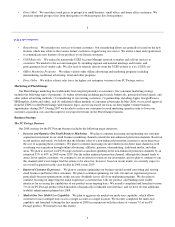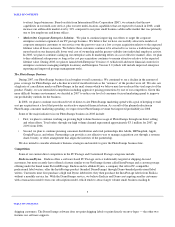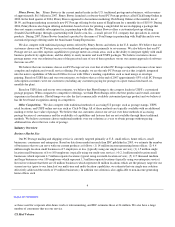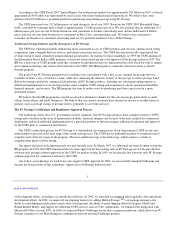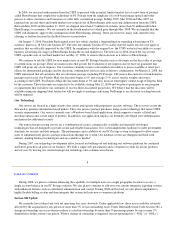Stamps.com 2007 Annual Report Download - page 17
Download and view the complete annual report
Please find page 17 of the 2007 Stamps.com annual report below. You can navigate through the pages in the report by either clicking on the pages listed below, or by using the keyword search tool below to find specific information within the annual report.
face could seriously harm our business.
If we do not respond effectively to technological change, our services and products could become obsolete and our business
will suffer.
The development of our services, products and other technology entails significant technical and business risks. To remain
competitive, we must continue to enhance and improve the responsiveness, functionality and features of our online operations.
The Internet and the electronic commerce industry are characterized by rapid technological change, changes in user and
customer requirements and preferences, frequent new product and service introductions embodying new technologies, and the
emergence of new industry standards and practices.
The evolving nature of the Internet or the postage markets could render our existing technology and systems obsolete. Our
success will depend, in part, on our ability to (i) license or acquire leading technologies
14
TABLE OF CONTENTS
useful in our business, (ii) enhance our existing services, (iii) develop new services or features and technology that address the
increasingly sophisticated and varied needs of our current and prospective users, and (iv) respond to technological advances and
emerging industry and regulatory standards and practices in a cost-effective and timely manner.
Future advances in technology may not be beneficial to, or compatible with, our business. Furthermore, we may not be
successful in using new technologies effectively or adapting our technology and systems to user requirements or emerging
industry standards on a timely basis. Our ability to remain technologically competitive may require substantial expenditures and
lead time. If we are unable to adapt in a timely manner to changing market conditions or user requirements, our business,
financial condition and results of operations could be seriously harmed.
Our operating results could be impaired if we or the Internet become subject to additional government regulation and legal
uncertainties.
Due to the increasing popularity and use of the Internet, it is possible that a number of laws and regulations may be adopted
with respect to the Internet, relating to user privacy, pricing, content, copyrights, distribution, characteristics and quality of
products and services, and export controls.
The adoption of any additional laws or regulations may hinder the expansion of the Internet. A decline in the growth of the
Internet could decrease demand for our products and services and increase our cost of doing business. Moreover, the
applicability of existing laws to the Internet is uncertain with regard to many issues, including property ownership, export of
specialized technology, sales tax, libel and personal privacy. Our business, financial condition and results of operations could be
seriously harmed by any new legislation or regulation. The application of laws and regulations from jurisdictions whose laws do
not currently apply to our business, or the application of existing laws and regulations to the Internet and other online services
could also harm our business.
We have employees and offer our services in multiple states, and we may in the future expand internationally. These
jurisdictions may claim that we are required to qualify to do business as a foreign corporation in each state or foreign country.
Our failure to qualify as a foreign corporation in a jurisdiction where we are required to do so could subject us to taxes and
penalties. Other states and foreign countries may also attempt to regulate our services or prosecute us for violations of their laws.
Further, we might unintentionally violate the laws of domestic or foreign jurisdictions and those laws may be modified and new
laws may be enacted in the future.
Risks Related to Our Stock
The tax value of our net operating losses could be impaired if we trigger a change of control pursuant to Section 382 of the
Internal Revenue Code.
Under IRC Section 382 rules, a change in ownership can occur whenever there is a shift in ownership by more than 50
percentage points by one or more five-percent shareholders within a three-year period. When a change of ownership is triggered,
our NOLs may be impaired. We estimate that, as of December 31, 2007 we were approximately at 34% compared with the 50%
level that would trigger impairment of our NOLs and tax credits.
As part of our ongoing program to preserve future use of our NOLs, we strongly urge any person contemplating owning
more than 800,000 of our shares to contact us before doing so.


